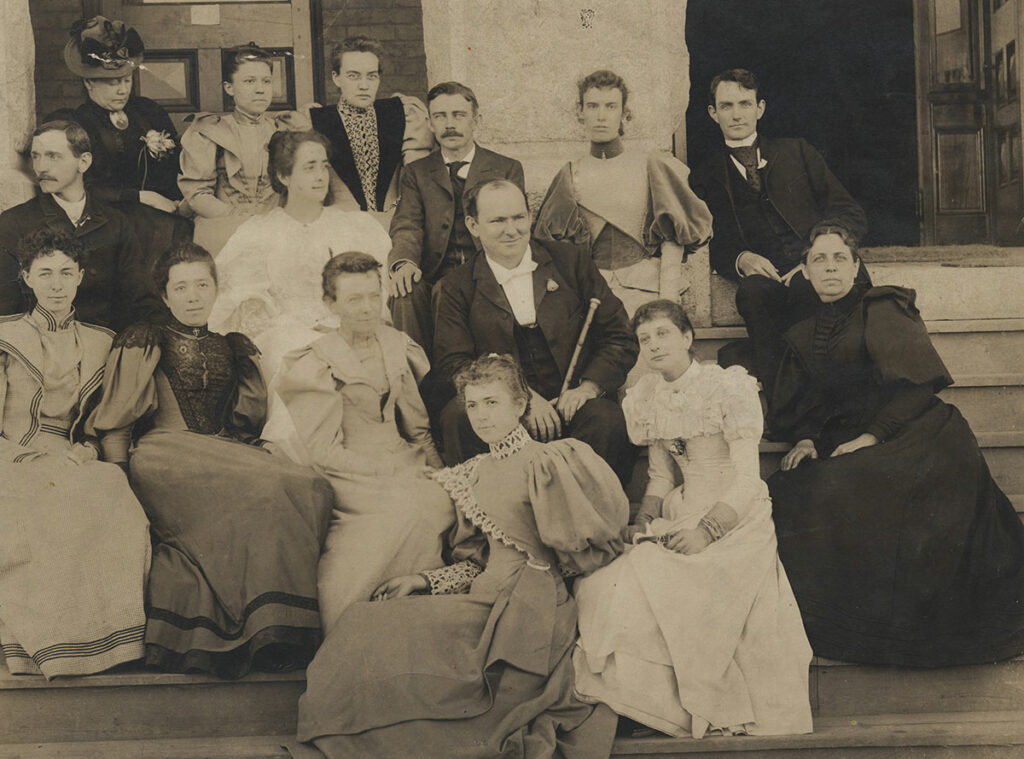History of UNCG
UNC Greensboro was established by legislative enactment on February 18, 1891. The City of Greensboro, situated near the geographical center of the state, was selected for the location of the new institution after its citizens approved $30,000 in bonds for its first buildings. R.S. Pullen and R.T. Gray gave the original 10-acre site. The institution opened on October 5, 1892, with a student body of 198 and a faculty of 15 – and the final enrollment reached 223 at the end of the first year. Classes were organized in three departments: commercial, domestic science, and pedagogy.

The institution came into being as a direct result of a crusade by Dr. Charles Duncan McIver on behalf of the education of women. Other pioneers in public school education – notably, Edwin A. Alderman, James Y. Joyner, and M.C.S. Noble – assisted McIver, but to him, more than to any other individual, the University owes its foundation.
During the past century, the University’s mission has evolved, as suggested by its sequence of names. It was known first as the State Normal and Industrial School, and after 1897 as the State Normal and Industrial College until 1919. During the period 1919-1931, it was known as the North Carolina College for Women and became the Woman’s College of the University of North Carolina from 1932 to 1963. It is warmly remembered as “the WC” by its many alumnae of the period.
From 1932 to 1963 the University was one of the three branches of the Consolidated University of North Carolina. The other campuses included The University of North Carolina at Chapel Hill and the North Carolina State College of Agriculture and Engineering at Raleigh (now N.C. State University). In 1962, the Board of Trustees recommended that the Greensboro campus become coeducational at all levels of instruction. Subsequently, by an act of the General Assembly in the spring of 1963, the name of the institution was changed to The University of North Carolina at Greensboro. The first African American students were admitted in 1956, and men were first admitted as part of the general student body in 1964.
In December of 1934, during the years of the Consolidated University, the Woman’s College Section of the Alpha of North Carolina Chapter of Phi Beta Kappa was installed. (Alpha Chapter is the one at Chapel Hill.) On February 17, 1956, the Epsilon Chapter of North Carolina was installed at this campus. In 2006, UNCG’s chapter was voted the best in the nation on a public university campus by the national Phi Beta Kappa organization.
In October of 1971, the North Carolina General Assembly adopted legislation that combined all 16 of the state-supported institutions of higher education into a single University of North Carolina. The UNC System is governed by a board of governors and administered by a president. Each constituent institution has a separate board of trustees and is administered by a chancellor.
UNCG’s chancellor is Dr. Franklin D. Gilliam, Jr., who took office on May 22, 2015. He came to UNCG from the University of California, Los Angeles (UCLA), where he was dean of the UCLA Luskin School of Public Affairs.
In addition to founding president Charles Duncan McIver, UNCG has been led to date by the following chief executive officers:
- Dr. Julius I. Foust (1906-1934)
- Dr. Walter Clinton Jackson (1934-1950)
- Dr. Edward Kidder Graham (1950-1956)
- Dr. W.W. Pierson Jr. (1956-1957, 1960-61, interim)
- Dr. Gordon W. Blackwell (1957-1960)
- Dr. Otis Singletary (1961-64, 1966)
- Dr. James S. Ferguson (1964-1979, including interim term)
- Dr. William E. Moran (1979-1994)
- Dr. Debra W. Stewart (Fall semester 1994, interim)
- Dr. Patricia A. Sullivan (1995-2008)
- Dr. Linda P. Brady (2008-2015)
- Dr. Dana L. Dunn (Spring, Summer semesters 2015, acting)
- Dr. Franklin D. Gilliam, Jr. (September 2015 – present day)